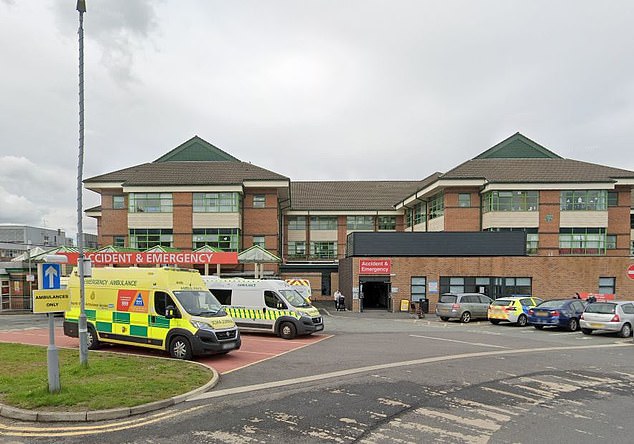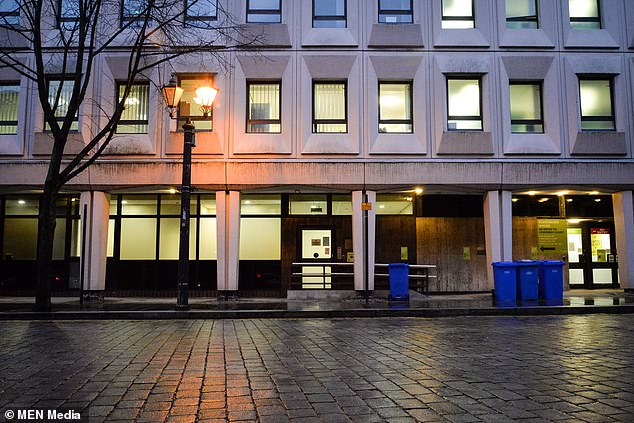Grandfather David Horsman, 65, died due to misadventure contributed to by neglect after suffering allergic reaction to CT scan at NHS hospital, coroner concludes
A grandfather died in an NHS hospital as a result of a misadventure caused by neglect after he had an allergic reaction to a CT scan, a coroner has concluded.
David Horsman, 65, died on March 28, 2022, after going into cardiac arrest in a mobile CT scanner in a car park at Royal Bolton Hospital.
An inquest has heard that a miscommunication between the hospital operator and a radiographer who carried out the scan ‘significantly contributed’ to the retired engineer’s death.
Bolton Coroners’ Court was told that the radiographer made an emergency call to the operator after David had an anaphylactic reaction to the contrast dye he had been injected with prior to a routine check.
But the operator sent the hospital’s crash team to a children’s ward instead of the mobile scanning van after they misanswered the call and misheard two more people.
Coroner John Pollard said this miscommunication led to a ‘critical delay’ in David receiving proper treatment as he waited at least 17 minutes after the first call was made.
David Horsman (pictured) died on March 28, 2022, after going into cardiac arrest in a mobile CT scanner in a car park at Royal Bolton Hospital

An inquest has heard that a miscommunication between the hospital operator and a radiographer who carried out the scan ‘significantly contributed’ to the retired engineer’s death (file image from Royal Bolton Hospital)
At the end of the inquest on Friday, the coroner said that ‘the level, tone and effectiveness of these calls are well below what we would accept as a reasonable standard’.
After the initial initial call was made, the radiographer made two more calls to the call handler, but they continued to misunderstand the correct location of the cardiac arrest call even though it would have been displayed on her screen.
According to the coroner, if the correct location had been properly communicated to the crash team, they could have arrived to help David before he went into cardiac arrest, and on the balance of probabilities he would have survived.
The scan took place as a routine check because David had survived colon cancer. He had never previously experienced a reaction during his annual CT scans.
Speaking after the inquest, David’s widow Jane Horsman said: ‘David went to hospital for a routine scan and I stayed at home due to the Covid restrictions still in place at the Royal Bolton Hospital. We had no trouble with the procedure and spent the time preparing for a vacation we were going to take.
‘I was shocked when I got the call that David had had a reaction to the CT scan procedure, and the next day my world was turned upside down.
‘After David recovered well from colon cancer three years earlier, his death was completely unforeseen. To lose him at the beginning of our retirement was and continues to be devastating.
‘Learning of the circumstances surrounding David’s death and the failings at the Royal Bolton Hospital have made me sick. I expected David to be safe and would have trusted the hospital staff to take good care of him if something went wrong. Something went wrong, but the hospital failed David and his family. I am shocked.

The inquest into the death of David Horsman is being held at Bolton Coroner’s Office (pictured)
‘I am grateful to the coroner for his careful consideration of what happened the day before David died.
‘I am also grateful for the work and support of Stephen Jones of Leigh Day in my case, which has enabled me to achieve justice for what happened to David.’
Jane Horsman was represented at the inquest by Leigh Day clinical negligence partner Stephen Jones.
Stephen Jones said: ‘Listening to the conversation recordings played in court and hearing how things went so tragically and needlessly wrong was deeply disturbing.
The process of calling the crash team was quite simple, but was simply not handled properly. The crash team had to roam the hospital to try to locate the emergency, and when they finally encountered David, it proved too late to save him. David’s death should have been prevented.”
